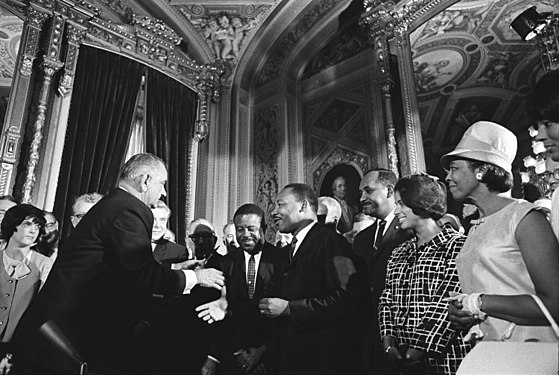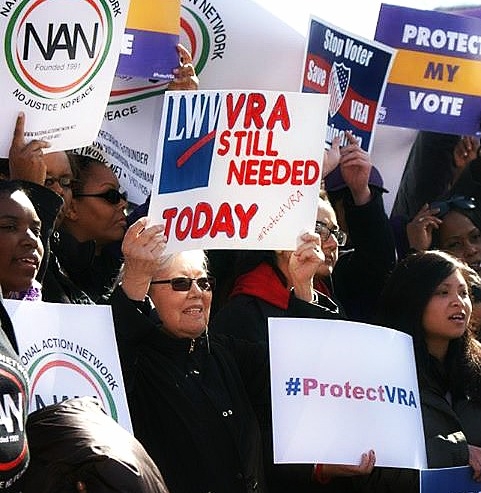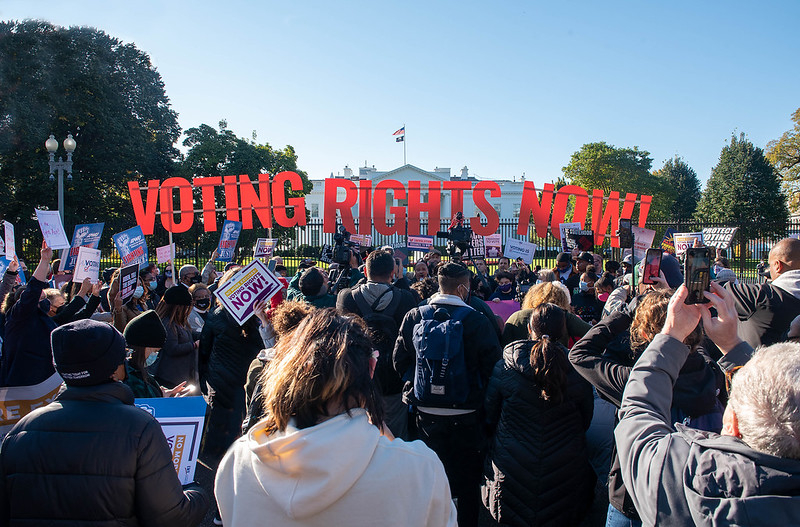As we celebrate the 60th anniversary of the Voting Rights Act of 1965, legal intern Jayla Smith interviewed Chief of Activation and Justice Marcia Johnson about the impact of the law and how we can ensure that its legacy continues.
Tell Congress to Restore the VRA!
Q: The Voting Rights Act of 1965 (VRA) is the most transformative civil rights legislation in American history, marking a turning point in dismantling racially discriminatory Jim Crow laws and ensuring meaningful access to the ballot, particularly in the Deep South. Why was the VRA needed?
A: Despite the protections provided against discrimination in the Fourteenth and Fifteenth Amendments, states — primarily in the South — were openly and violently denying the right to vote to Black Americans. While voting laws in these states were neutral on their face, they were implemented in a way that made it harder for Black Americans to vote. The result was abysmally low voter registration rates.
In response, civil rights activists protested across the US, demanding equal voting rights for people of all races. After the televised attack on peaceful protestors at the foot of the Edmund Pettus Bridge in Selma, Alabama, in March 1965, President Lyndon Johnson introduced the VRA. Congress passed it on August 6, 1965. In that moment, Congress recognized the need to pass a law that would ensure that states could not deny any voter access to the ballot.
,

President Lyndon B. Johnson and Dr. Martin Luther King, Jr., at the signing of the Voting Rights Act
,
Q: What were the most important impacts of the VRA, especially for Black voters, and how did it help reshape American democracy at both the national and local levels?
A: Provisions like Section 5 of the VRA were particularly transformative. Section 5 prevented states and jurisdictions with histories of racial discrimination in voting from making any changes to voting or election procedures — even moving a polling place — without being reviewed by a federal court in DC. The burden was on the jurisdiction to show that the change was not discriminatory before it could go into effect. Unfortunately, Section 5 has been inoperable since 2013 after the US Supreme Court struck down the formula that determined which jurisdictions were subject to Section 5 in Shelby County (Alabama) v. Holder.
It is now up to Congress to act so that this provision can once again address voting discrimination. Currently, we are relying on costly litigation to address it.
,
,
Q: You were part of the effort to reauthorize provisions of the VRA in 2006; what was that process like? Was it contentious and partisan?
A: Believe it or not, unlike today’s climate around voting, past reauthorizations of the VRA were a bipartisan effort. Both Republicans and Democrats believed in the goals and successes of the VRA and understood how important it was in preventing and protecting against racial discrimination in voting.
In 2006, Congress considered thousands of pages that showed discrimination in voting continued to exist. They voted 390 – 33 in the House and unanimously in the Senate to reauthorize the law.
,

,
Q: The Supreme Court majority in Shelby County (Alabama) v. Holder argued that Section 5’s coverage formula was outdated, despite the findings by Congress that significant voting discrimination persisted. Justice Ruth Bader Ginsburg’s dissent famously compared dismantling Section 5 to “throwing away your umbrella in a rainstorm.” How apt do you think that metaphor has been?
A: Unfortunately, Justice Ginsburg’s prediction has come true. Nearly 100 restrictive voting laws have been passed in the 10 years since the decision. Twenty-nine were passed in states subject to Section 5, several of which were later struck down by federal courts as racially discriminatory.
Because of these anti-voter laws, organizations such as the League have had to file litigation that is costly, and it takes years for courts to reach a final decision. In the meantime, eligible voters are being denied.
,
,
Q: Beyond the legislative gridlock, many advocates — such as yourself — have continued pushing forward through litigation, community organizing, and state-level reforms. What strategies have proven most effective in the post-Shelby County landscape? Where do you think the next phase of the fight for voting rights is?
A: Without Section 5, advocates and attorneys have relied heavily on Section 2 of the VRA. Section 2 prohibits racial discrimination in voting. Unlike in Section 5, the voting laws and procedures brought into question under Section 2 can still be in place while cases are brought against them. For example, if someone claims that voter ID laws violate Section 2, those laws can remain in place until the case is fully decided. Also, since Shelby County, the Supreme Court has made it harder to establish voting discrimination under Section 2.
The Supreme Court has asked for a re-argument in a critical redistricting case, Louisiana v. Callais, in its October 2025 term, during which it will consider the constitutionality of Section 2. The case arises from a challenge to the creation of majority-minority congressional districts in Louisiana under Section 2. Many experts fear the Court will strike down Section 2 altogether after years of weakening it. And one federal appellate court has already ruled that neither private organizations such as the League nor voters can bring litigation under section 2 of the Voting Rights Act. This decision has blocked Section 2 litigation in eight states for several months, and the question is likely headed to the high court.
One encouraging development is in the push for state-level Voting Rights Acts. Several states — most recently Colorado — have passed their own Voting Rights Acts to protect voters and prohibit racial discrimination in voting in their states. The League is proud to support these efforts.
,

,
Q: On the anniversary of the passage of the VRA, what gives you hope, and what should young lawyers or advocates focus on to carry this work forward? What can the average person do right now?
A: The power of democracy is held by the people. We are the keepers of our democracy, and we must protect it.
Democracy is not just about voting. It is about holding our elected officials accountable. We must insist that Congress pass legislation such as the John Lewis Voting Rights Advancement Act that will restore needed protections to the Voting Rights Act. We must speak out in our state legislatures against the passage of the suppressive voting laws, and we must not stop advocating for strong voting rights legislation so that the gains of the VRA will not be lost to future generations.
I encourage everyone who cares about what happens in our democracy to join initiatives such as Unite & Rise 8.5 to get information about how we can continue the fight for a true multi-racial democracy, the type of democracy that is the goal of legislation such as the Voting Rights Act.